
2018.01.25 Nobelist Crafts Light-Switchable Antibiotics
介绍: Yesterday, January 24th, 2018, at the World Economic Forum in Davos, Scientific American editor-in-chief Mariette DiChristina ran into Ben Feringa. He shared the 2016 Nobel Prize for chemistry for designing and creating molecules that function as microscopic machines.
MD: Ben Feringa and I are walking throug...
介绍: Yesterday, January 24th, 2018, at the World Economic Forum in Davos, Scientific American editor-in-chief Mariette DiChristina ran into Ben Feringa. He shared the 2016 Nobel Prize for chemistry for designing and creating molecules that function as microscopic machines.
MD: Ben Feringa and I are walking through Davos about to go to our next appointment. And I was just asking Professor Feringa, what was exciting to him right now?
BF: The most exciting thing probably we’re working on now is to make antibiotics that we can switch with light. So we have, you know antibiotics is a real big problem, antibiotic resistance, and what we do is we build in light switches in antibiotics, and they’re off, and then we can switch them on with light, and after 24 hours when they have done their job, they switch off automatically. And the bugs don’t build up resistance. And it works. And recently we got it done with red light, and that’s really exciting, because now we can get light into the body, because red light…
MD: Goes deeper.
BF: Goes very deep in the body. And that gives us a lot of opportunities to develop these smart drugs.
For a video of a longer conversation between Mariette DiChristina and Ben Feringa go to the World Economic Forum homepage, and search for Ben Feringa.
—Steve Mirsky




